Leadership and Management for Service Industries (GB)
VerifiedAdded on 2023/06/15
|13
|3984
|61
AI Summary
This study provides information about leadership styles and how they effective manner performance of overall industry with proper planning and application of theories and models. It also covers internal and external factors that influence sustainable leadership, current management and leadership hard and soft skills in hospitality sector, and future management leadership skills requirements in service sector and their achievement.
Contribute Materials
Your contribution can guide someone’s learning journey. Share your
documents today.
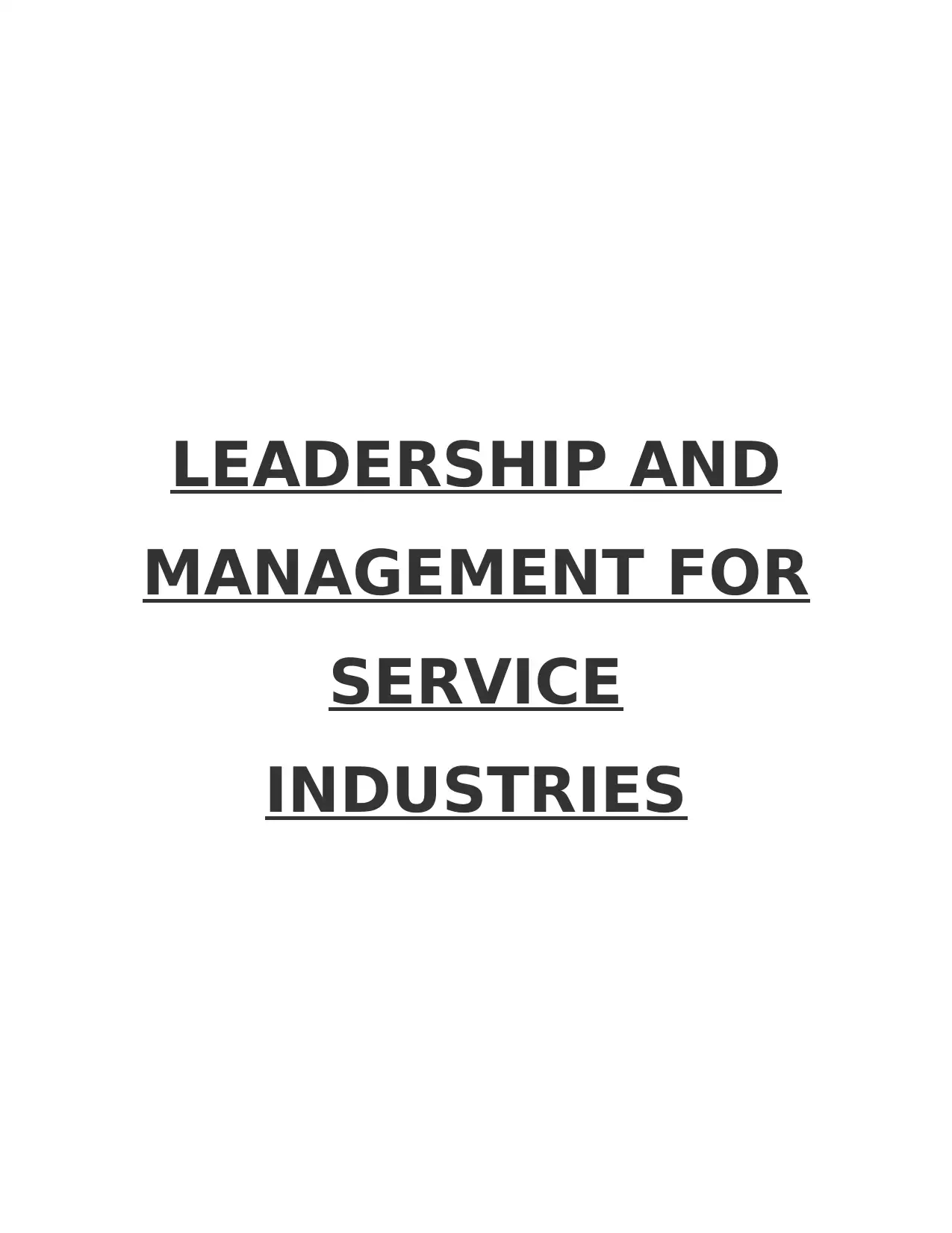
LEADERSHIP AND
MANAGEMENT FOR
SERVICE
INDUSTRIES
MANAGEMENT FOR
SERVICE
INDUSTRIES
Secure Best Marks with AI Grader
Need help grading? Try our AI Grader for instant feedback on your assignments.
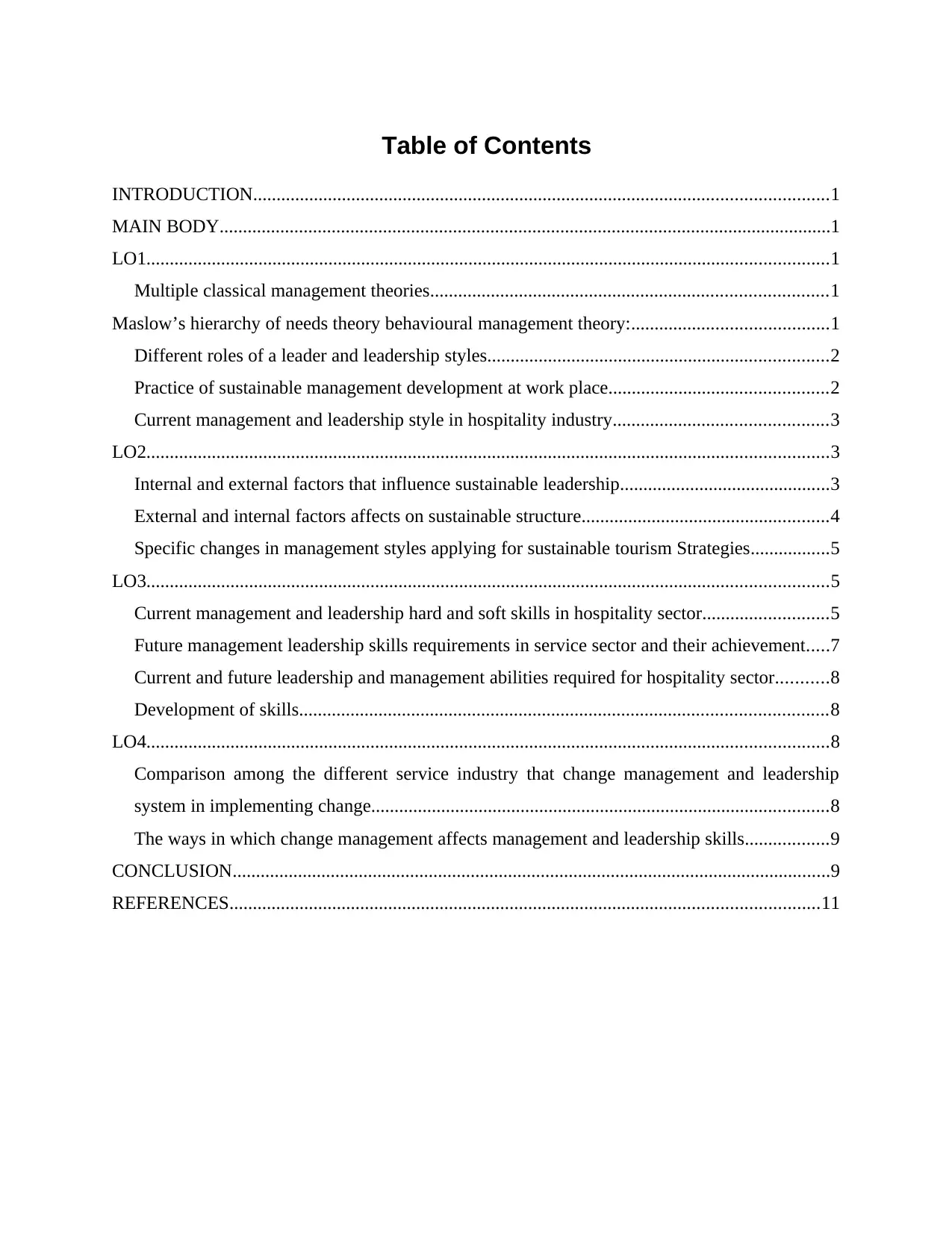
Table of Contents
INTRODUCTION...........................................................................................................................1
MAIN BODY...................................................................................................................................1
LO1..................................................................................................................................................1
Multiple classical management theories.....................................................................................1
Maslow’s hierarchy of needs theory behavioural management theory:..........................................1
Different roles of a leader and leadership styles.........................................................................2
Practice of sustainable management development at work place...............................................2
Current management and leadership style in hospitality industry..............................................3
LO2..................................................................................................................................................3
Internal and external factors that influence sustainable leadership.............................................3
External and internal factors affects on sustainable structure.....................................................4
Specific changes in management styles applying for sustainable tourism Strategies.................5
LO3..................................................................................................................................................5
Current management and leadership hard and soft skills in hospitality sector...........................5
Future management leadership skills requirements in service sector and their achievement.....7
Current and future leadership and management abilities required for hospitality sector...........8
Development of skills.................................................................................................................8
LO4..................................................................................................................................................8
Comparison among the different service industry that change management and leadership
system in implementing change..................................................................................................8
The ways in which change management affects management and leadership skills..................9
CONCLUSION................................................................................................................................9
REFERENCES..............................................................................................................................11
INTRODUCTION...........................................................................................................................1
MAIN BODY...................................................................................................................................1
LO1..................................................................................................................................................1
Multiple classical management theories.....................................................................................1
Maslow’s hierarchy of needs theory behavioural management theory:..........................................1
Different roles of a leader and leadership styles.........................................................................2
Practice of sustainable management development at work place...............................................2
Current management and leadership style in hospitality industry..............................................3
LO2..................................................................................................................................................3
Internal and external factors that influence sustainable leadership.............................................3
External and internal factors affects on sustainable structure.....................................................4
Specific changes in management styles applying for sustainable tourism Strategies.................5
LO3..................................................................................................................................................5
Current management and leadership hard and soft skills in hospitality sector...........................5
Future management leadership skills requirements in service sector and their achievement.....7
Current and future leadership and management abilities required for hospitality sector...........8
Development of skills.................................................................................................................8
LO4..................................................................................................................................................8
Comparison among the different service industry that change management and leadership
system in implementing change..................................................................................................8
The ways in which change management affects management and leadership skills..................9
CONCLUSION................................................................................................................................9
REFERENCES..............................................................................................................................11
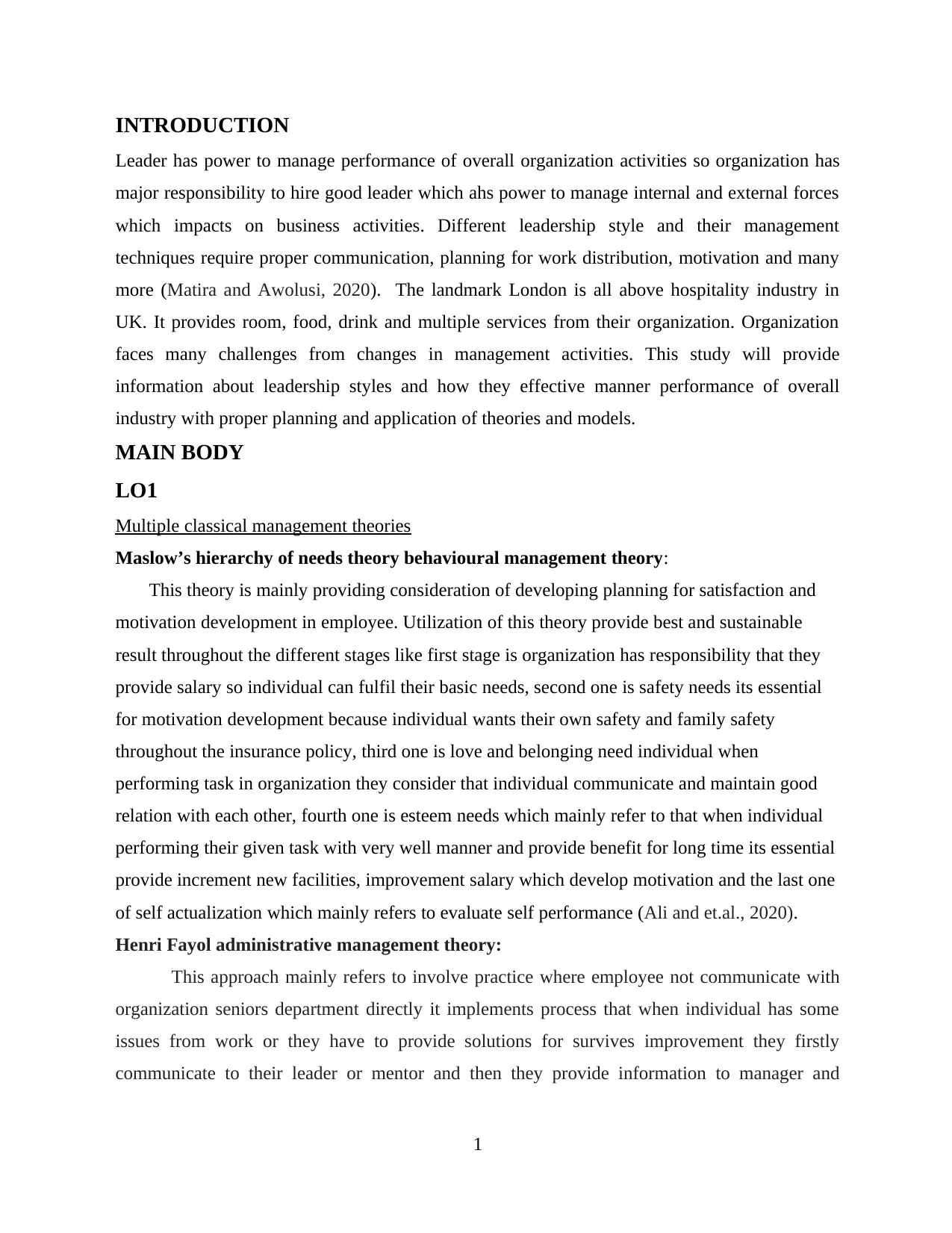
INTRODUCTION
Leader has power to manage performance of overall organization activities so organization has
major responsibility to hire good leader which ahs power to manage internal and external forces
which impacts on business activities. Different leadership style and their management
techniques require proper communication, planning for work distribution, motivation and many
more (Matira and Awolusi, 2020). The landmark London is all above hospitality industry in
UK. It provides room, food, drink and multiple services from their organization. Organization
faces many challenges from changes in management activities. This study will provide
information about leadership styles and how they effective manner performance of overall
industry with proper planning and application of theories and models.
MAIN BODY
LO1
Multiple classical management theories
Maslow’s hierarchy of needs theory behavioural management theory:
This theory is mainly providing consideration of developing planning for satisfaction and
motivation development in employee. Utilization of this theory provide best and sustainable
result throughout the different stages like first stage is organization has responsibility that they
provide salary so individual can fulfil their basic needs, second one is safety needs its essential
for motivation development because individual wants their own safety and family safety
throughout the insurance policy, third one is love and belonging need individual when
performing task in organization they consider that individual communicate and maintain good
relation with each other, fourth one is esteem needs which mainly refer to that when individual
performing their given task with very well manner and provide benefit for long time its essential
provide increment new facilities, improvement salary which develop motivation and the last one
of self actualization which mainly refers to evaluate self performance (Ali and et.al., 2020).
Henri Fayol administrative management theory:
This approach mainly refers to involve practice where employee not communicate with
organization seniors department directly it implements process that when individual has some
issues from work or they have to provide solutions for survives improvement they firstly
communicate to their leader or mentor and then they provide information to manager and
1
Leader has power to manage performance of overall organization activities so organization has
major responsibility to hire good leader which ahs power to manage internal and external forces
which impacts on business activities. Different leadership style and their management
techniques require proper communication, planning for work distribution, motivation and many
more (Matira and Awolusi, 2020). The landmark London is all above hospitality industry in
UK. It provides room, food, drink and multiple services from their organization. Organization
faces many challenges from changes in management activities. This study will provide
information about leadership styles and how they effective manner performance of overall
industry with proper planning and application of theories and models.
MAIN BODY
LO1
Multiple classical management theories
Maslow’s hierarchy of needs theory behavioural management theory:
This theory is mainly providing consideration of developing planning for satisfaction and
motivation development in employee. Utilization of this theory provide best and sustainable
result throughout the different stages like first stage is organization has responsibility that they
provide salary so individual can fulfil their basic needs, second one is safety needs its essential
for motivation development because individual wants their own safety and family safety
throughout the insurance policy, third one is love and belonging need individual when
performing task in organization they consider that individual communicate and maintain good
relation with each other, fourth one is esteem needs which mainly refer to that when individual
performing their given task with very well manner and provide benefit for long time its essential
provide increment new facilities, improvement salary which develop motivation and the last one
of self actualization which mainly refers to evaluate self performance (Ali and et.al., 2020).
Henri Fayol administrative management theory:
This approach mainly refers to involve practice where employee not communicate with
organization seniors department directly it implements process that when individual has some
issues from work or they have to provide solutions for survives improvement they firstly
communicate to their leader or mentor and then they provide information to manager and
1
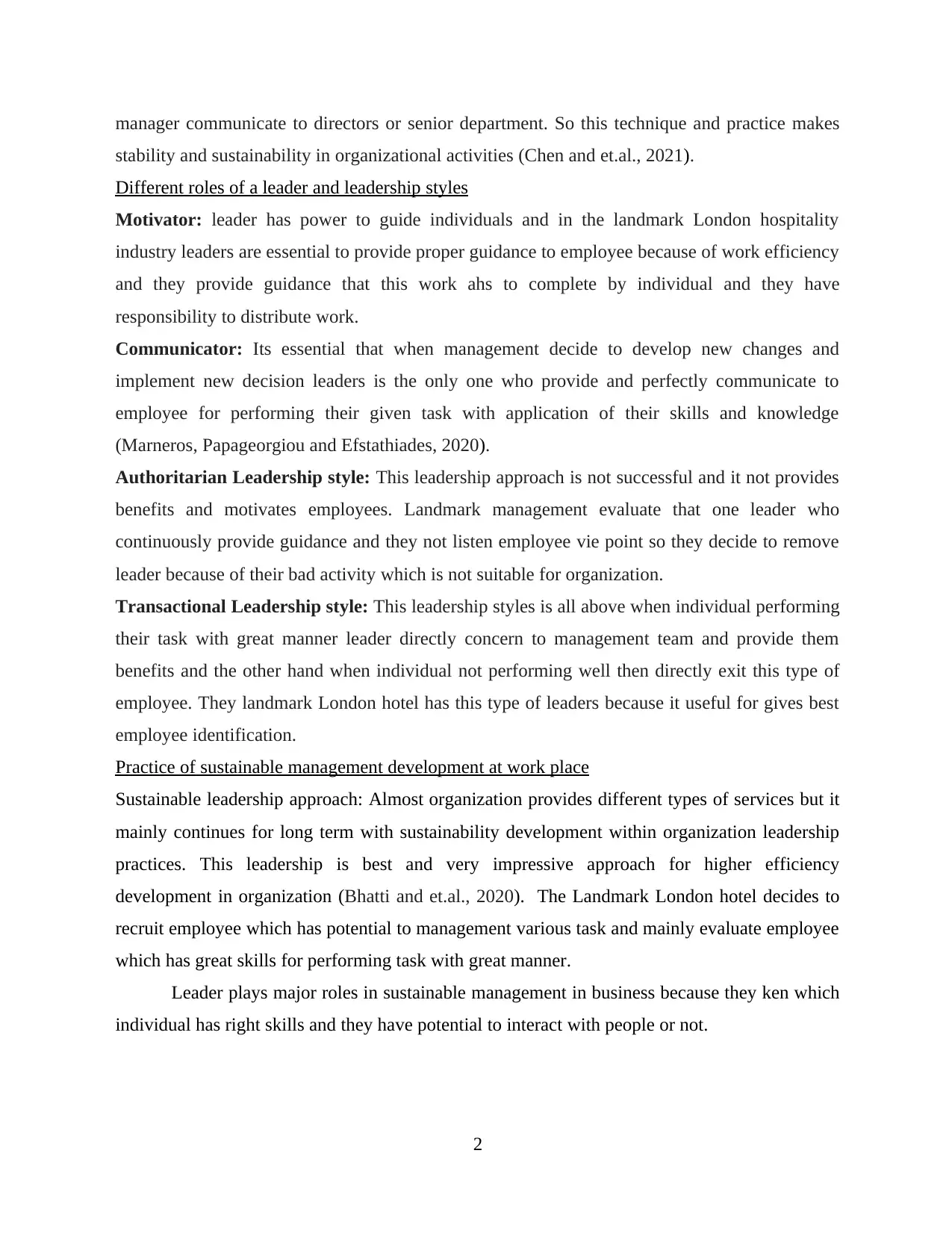
manager communicate to directors or senior department. So this technique and practice makes
stability and sustainability in organizational activities (Chen and et.al., 2021).
Different roles of a leader and leadership styles
Motivator: leader has power to guide individuals and in the landmark London hospitality
industry leaders are essential to provide proper guidance to employee because of work efficiency
and they provide guidance that this work ahs to complete by individual and they have
responsibility to distribute work.
Communicator: Its essential that when management decide to develop new changes and
implement new decision leaders is the only one who provide and perfectly communicate to
employee for performing their given task with application of their skills and knowledge
(Marneros, Papageorgiou and Efstathiades, 2020).
Authoritarian Leadership style: This leadership approach is not successful and it not provides
benefits and motivates employees. Landmark management evaluate that one leader who
continuously provide guidance and they not listen employee vie point so they decide to remove
leader because of their bad activity which is not suitable for organization.
Transactional Leadership style: This leadership styles is all above when individual performing
their task with great manner leader directly concern to management team and provide them
benefits and the other hand when individual not performing well then directly exit this type of
employee. They landmark London hotel has this type of leaders because it useful for gives best
employee identification.
Practice of sustainable management development at work place
Sustainable leadership approach: Almost organization provides different types of services but it
mainly continues for long term with sustainability development within organization leadership
practices. This leadership is best and very impressive approach for higher efficiency
development in organization (Bhatti and et.al., 2020). The Landmark London hotel decides to
recruit employee which has potential to management various task and mainly evaluate employee
which has great skills for performing task with great manner.
Leader plays major roles in sustainable management in business because they ken which
individual has right skills and they have potential to interact with people or not.
2
stability and sustainability in organizational activities (Chen and et.al., 2021).
Different roles of a leader and leadership styles
Motivator: leader has power to guide individuals and in the landmark London hospitality
industry leaders are essential to provide proper guidance to employee because of work efficiency
and they provide guidance that this work ahs to complete by individual and they have
responsibility to distribute work.
Communicator: Its essential that when management decide to develop new changes and
implement new decision leaders is the only one who provide and perfectly communicate to
employee for performing their given task with application of their skills and knowledge
(Marneros, Papageorgiou and Efstathiades, 2020).
Authoritarian Leadership style: This leadership approach is not successful and it not provides
benefits and motivates employees. Landmark management evaluate that one leader who
continuously provide guidance and they not listen employee vie point so they decide to remove
leader because of their bad activity which is not suitable for organization.
Transactional Leadership style: This leadership styles is all above when individual performing
their task with great manner leader directly concern to management team and provide them
benefits and the other hand when individual not performing well then directly exit this type of
employee. They landmark London hotel has this type of leaders because it useful for gives best
employee identification.
Practice of sustainable management development at work place
Sustainable leadership approach: Almost organization provides different types of services but it
mainly continues for long term with sustainability development within organization leadership
practices. This leadership is best and very impressive approach for higher efficiency
development in organization (Bhatti and et.al., 2020). The Landmark London hotel decides to
recruit employee which has potential to management various task and mainly evaluate employee
which has great skills for performing task with great manner.
Leader plays major roles in sustainable management in business because they ken which
individual has right skills and they have potential to interact with people or not.
2
Secure Best Marks with AI Grader
Need help grading? Try our AI Grader for instant feedback on your assignments.
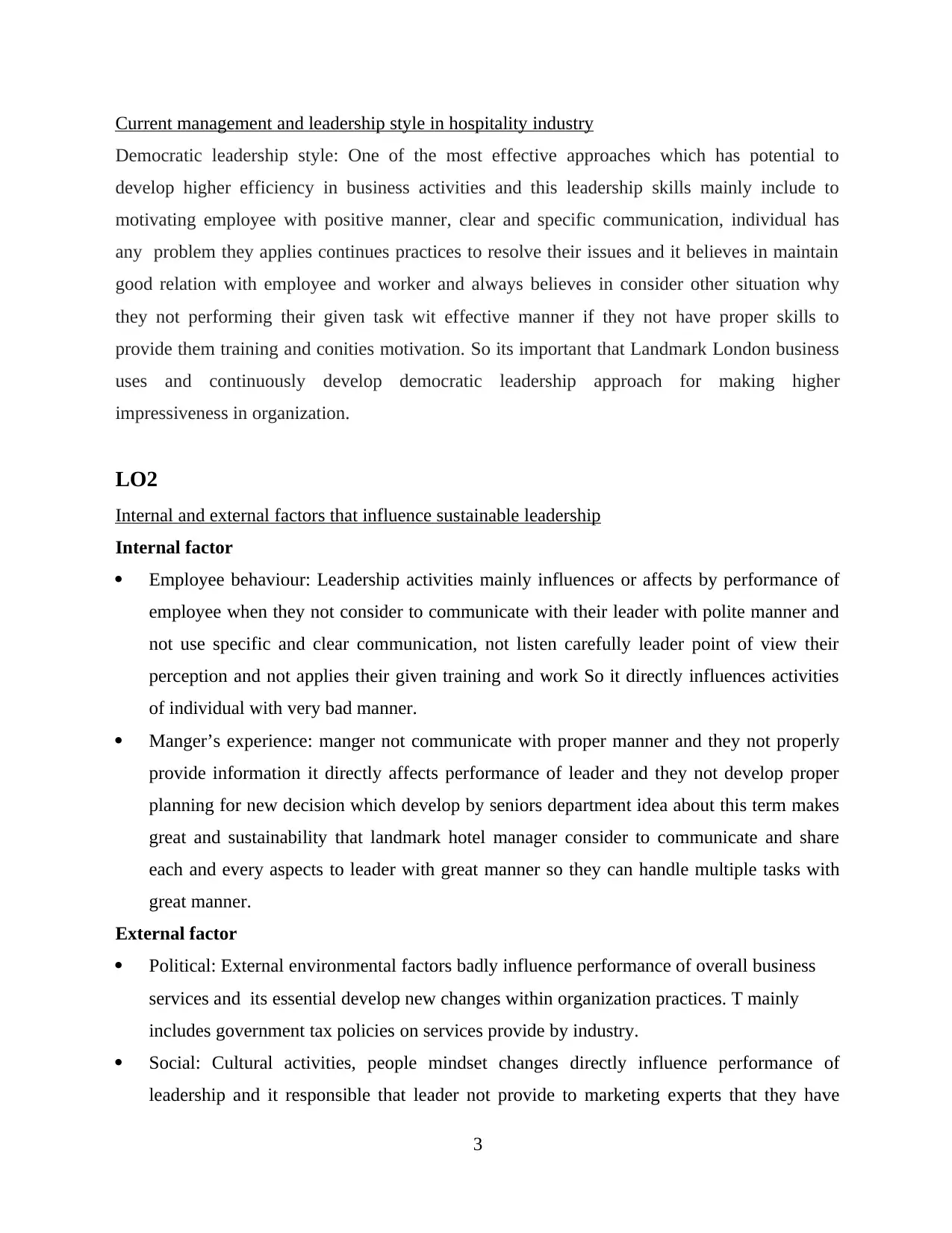
Current management and leadership style in hospitality industry
Democratic leadership style: One of the most effective approaches which has potential to
develop higher efficiency in business activities and this leadership skills mainly include to
motivating employee with positive manner, clear and specific communication, individual has
any problem they applies continues practices to resolve their issues and it believes in maintain
good relation with employee and worker and always believes in consider other situation why
they not performing their given task wit effective manner if they not have proper skills to
provide them training and conities motivation. So its important that Landmark London business
uses and continuously develop democratic leadership approach for making higher
impressiveness in organization.
LO2
Internal and external factors that influence sustainable leadership
Internal factor
Employee behaviour: Leadership activities mainly influences or affects by performance of
employee when they not consider to communicate with their leader with polite manner and
not use specific and clear communication, not listen carefully leader point of view their
perception and not applies their given training and work So it directly influences activities
of individual with very bad manner.
Manger’s experience: manger not communicate with proper manner and they not properly
provide information it directly affects performance of leader and they not develop proper
planning for new decision which develop by seniors department idea about this term makes
great and sustainability that landmark hotel manager consider to communicate and share
each and every aspects to leader with great manner so they can handle multiple tasks with
great manner.
External factor
Political: External environmental factors badly influence performance of overall business
services and its essential develop new changes within organization practices. T mainly
includes government tax policies on services provide by industry.
Social: Cultural activities, people mindset changes directly influence performance of
leadership and it responsible that leader not provide to marketing experts that they have
3
Democratic leadership style: One of the most effective approaches which has potential to
develop higher efficiency in business activities and this leadership skills mainly include to
motivating employee with positive manner, clear and specific communication, individual has
any problem they applies continues practices to resolve their issues and it believes in maintain
good relation with employee and worker and always believes in consider other situation why
they not performing their given task wit effective manner if they not have proper skills to
provide them training and conities motivation. So its important that Landmark London business
uses and continuously develop democratic leadership approach for making higher
impressiveness in organization.
LO2
Internal and external factors that influence sustainable leadership
Internal factor
Employee behaviour: Leadership activities mainly influences or affects by performance of
employee when they not consider to communicate with their leader with polite manner and
not use specific and clear communication, not listen carefully leader point of view their
perception and not applies their given training and work So it directly influences activities
of individual with very bad manner.
Manger’s experience: manger not communicate with proper manner and they not properly
provide information it directly affects performance of leader and they not develop proper
planning for new decision which develop by seniors department idea about this term makes
great and sustainability that landmark hotel manager consider to communicate and share
each and every aspects to leader with great manner so they can handle multiple tasks with
great manner.
External factor
Political: External environmental factors badly influence performance of overall business
services and its essential develop new changes within organization practices. T mainly
includes government tax policies on services provide by industry.
Social: Cultural activities, people mindset changes directly influence performance of
leadership and it responsible that leader not provide to marketing experts that they have
3
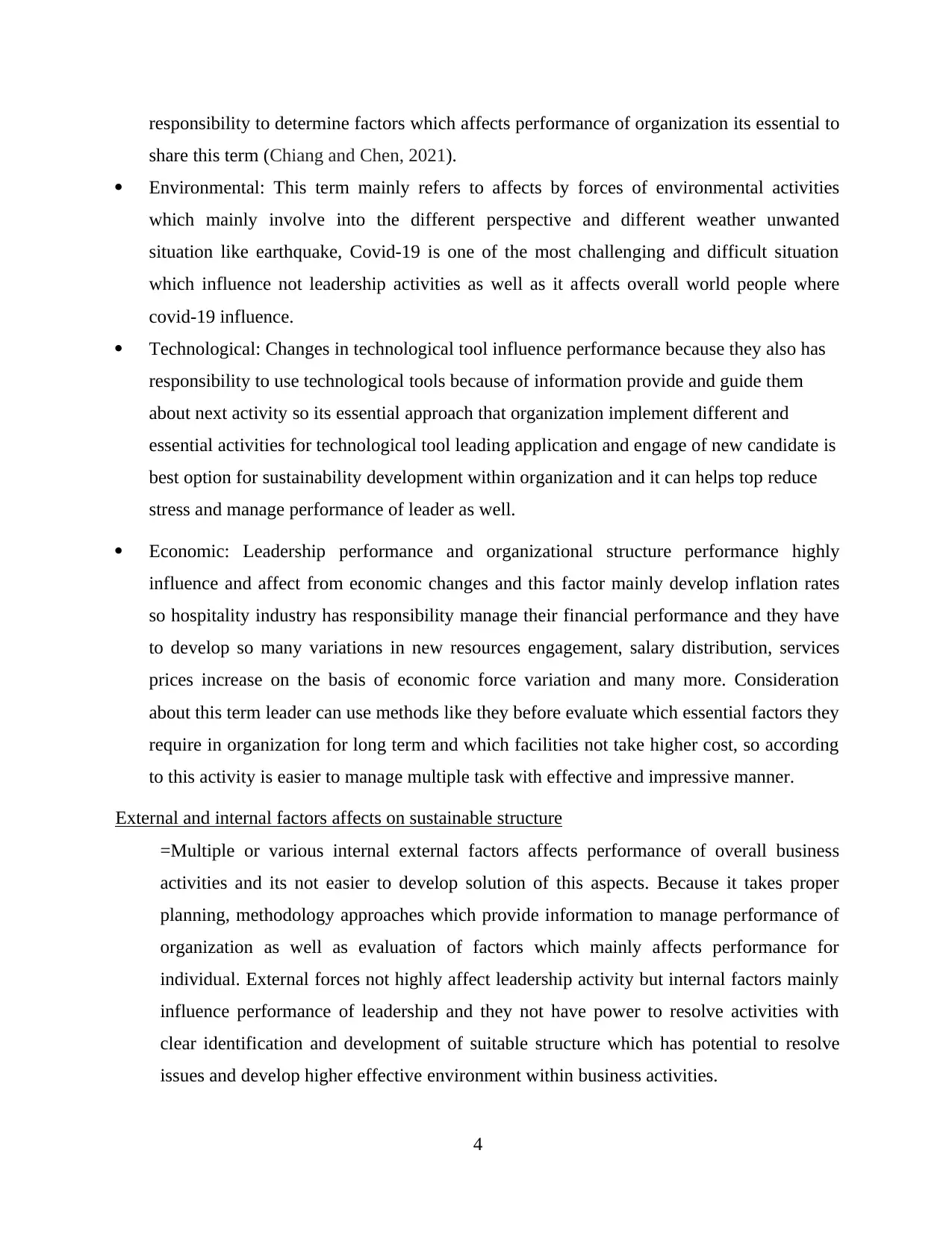
responsibility to determine factors which affects performance of organization its essential to
share this term (Chiang and Chen, 2021).
Environmental: This term mainly refers to affects by forces of environmental activities
which mainly involve into the different perspective and different weather unwanted
situation like earthquake, Covid-19 is one of the most challenging and difficult situation
which influence not leadership activities as well as it affects overall world people where
covid-19 influence.
Technological: Changes in technological tool influence performance because they also has
responsibility to use technological tools because of information provide and guide them
about next activity so its essential approach that organization implement different and
essential activities for technological tool leading application and engage of new candidate is
best option for sustainability development within organization and it can helps top reduce
stress and manage performance of leader as well.
Economic: Leadership performance and organizational structure performance highly
influence and affect from economic changes and this factor mainly develop inflation rates
so hospitality industry has responsibility manage their financial performance and they have
to develop so many variations in new resources engagement, salary distribution, services
prices increase on the basis of economic force variation and many more. Consideration
about this term leader can use methods like they before evaluate which essential factors they
require in organization for long term and which facilities not take higher cost, so according
to this activity is easier to manage multiple task with effective and impressive manner.
External and internal factors affects on sustainable structure
=Multiple or various internal external factors affects performance of overall business
activities and its not easier to develop solution of this aspects. Because it takes proper
planning, methodology approaches which provide information to manage performance of
organization as well as evaluation of factors which mainly affects performance for
individual. External forces not highly affect leadership activity but internal factors mainly
influence performance of leadership and they not have power to resolve activities with
clear identification and development of suitable structure which has potential to resolve
issues and develop higher effective environment within business activities.
4
share this term (Chiang and Chen, 2021).
Environmental: This term mainly refers to affects by forces of environmental activities
which mainly involve into the different perspective and different weather unwanted
situation like earthquake, Covid-19 is one of the most challenging and difficult situation
which influence not leadership activities as well as it affects overall world people where
covid-19 influence.
Technological: Changes in technological tool influence performance because they also has
responsibility to use technological tools because of information provide and guide them
about next activity so its essential approach that organization implement different and
essential activities for technological tool leading application and engage of new candidate is
best option for sustainability development within organization and it can helps top reduce
stress and manage performance of leader as well.
Economic: Leadership performance and organizational structure performance highly
influence and affect from economic changes and this factor mainly develop inflation rates
so hospitality industry has responsibility manage their financial performance and they have
to develop so many variations in new resources engagement, salary distribution, services
prices increase on the basis of economic force variation and many more. Consideration
about this term leader can use methods like they before evaluate which essential factors they
require in organization for long term and which facilities not take higher cost, so according
to this activity is easier to manage multiple task with effective and impressive manner.
External and internal factors affects on sustainable structure
=Multiple or various internal external factors affects performance of overall business
activities and its not easier to develop solution of this aspects. Because it takes proper
planning, methodology approaches which provide information to manage performance of
organization as well as evaluation of factors which mainly affects performance for
individual. External forces not highly affect leadership activity but internal factors mainly
influence performance of leadership and they not have power to resolve activities with
clear identification and development of suitable structure which has potential to resolve
issues and develop higher effective environment within business activities.
4
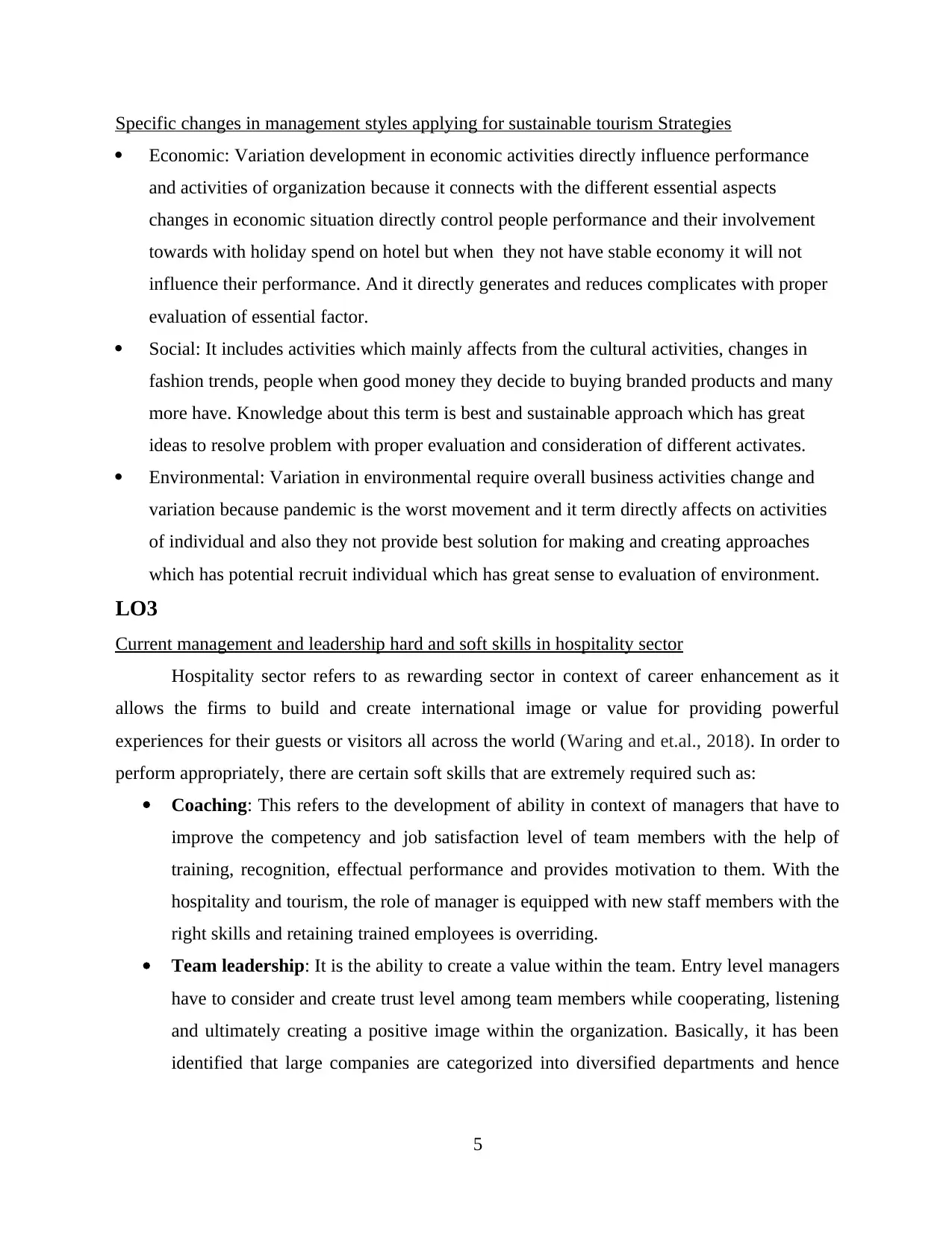
Specific changes in management styles applying for sustainable tourism Strategies
Economic: Variation development in economic activities directly influence performance
and activities of organization because it connects with the different essential aspects
changes in economic situation directly control people performance and their involvement
towards with holiday spend on hotel but when they not have stable economy it will not
influence their performance. And it directly generates and reduces complicates with proper
evaluation of essential factor.
Social: It includes activities which mainly affects from the cultural activities, changes in
fashion trends, people when good money they decide to buying branded products and many
more have. Knowledge about this term is best and sustainable approach which has great
ideas to resolve problem with proper evaluation and consideration of different activates.
Environmental: Variation in environmental require overall business activities change and
variation because pandemic is the worst movement and it term directly affects on activities
of individual and also they not provide best solution for making and creating approaches
which has potential recruit individual which has great sense to evaluation of environment.
LO3
Current management and leadership hard and soft skills in hospitality sector
Hospitality sector refers to as rewarding sector in context of career enhancement as it
allows the firms to build and create international image or value for providing powerful
experiences for their guests or visitors all across the world (Waring and et.al., 2018). In order to
perform appropriately, there are certain soft skills that are extremely required such as:
Coaching: This refers to the development of ability in context of managers that have to
improve the competency and job satisfaction level of team members with the help of
training, recognition, effectual performance and provides motivation to them. With the
hospitality and tourism, the role of manager is equipped with new staff members with the
right skills and retaining trained employees is overriding.
Team leadership: It is the ability to create a value within the team. Entry level managers
have to consider and create trust level among team members while cooperating, listening
and ultimately creating a positive image within the organization. Basically, it has been
identified that large companies are categorized into diversified departments and hence
5
Economic: Variation development in economic activities directly influence performance
and activities of organization because it connects with the different essential aspects
changes in economic situation directly control people performance and their involvement
towards with holiday spend on hotel but when they not have stable economy it will not
influence their performance. And it directly generates and reduces complicates with proper
evaluation of essential factor.
Social: It includes activities which mainly affects from the cultural activities, changes in
fashion trends, people when good money they decide to buying branded products and many
more have. Knowledge about this term is best and sustainable approach which has great
ideas to resolve problem with proper evaluation and consideration of different activates.
Environmental: Variation in environmental require overall business activities change and
variation because pandemic is the worst movement and it term directly affects on activities
of individual and also they not provide best solution for making and creating approaches
which has potential recruit individual which has great sense to evaluation of environment.
LO3
Current management and leadership hard and soft skills in hospitality sector
Hospitality sector refers to as rewarding sector in context of career enhancement as it
allows the firms to build and create international image or value for providing powerful
experiences for their guests or visitors all across the world (Waring and et.al., 2018). In order to
perform appropriately, there are certain soft skills that are extremely required such as:
Coaching: This refers to the development of ability in context of managers that have to
improve the competency and job satisfaction level of team members with the help of
training, recognition, effectual performance and provides motivation to them. With the
hospitality and tourism, the role of manager is equipped with new staff members with the
right skills and retaining trained employees is overriding.
Team leadership: It is the ability to create a value within the team. Entry level managers
have to consider and create trust level among team members while cooperating, listening
and ultimately creating a positive image within the organization. Basically, it has been
identified that large companies are categorized into diversified departments and hence
5
Paraphrase This Document
Need a fresh take? Get an instant paraphrase of this document with our AI Paraphraser
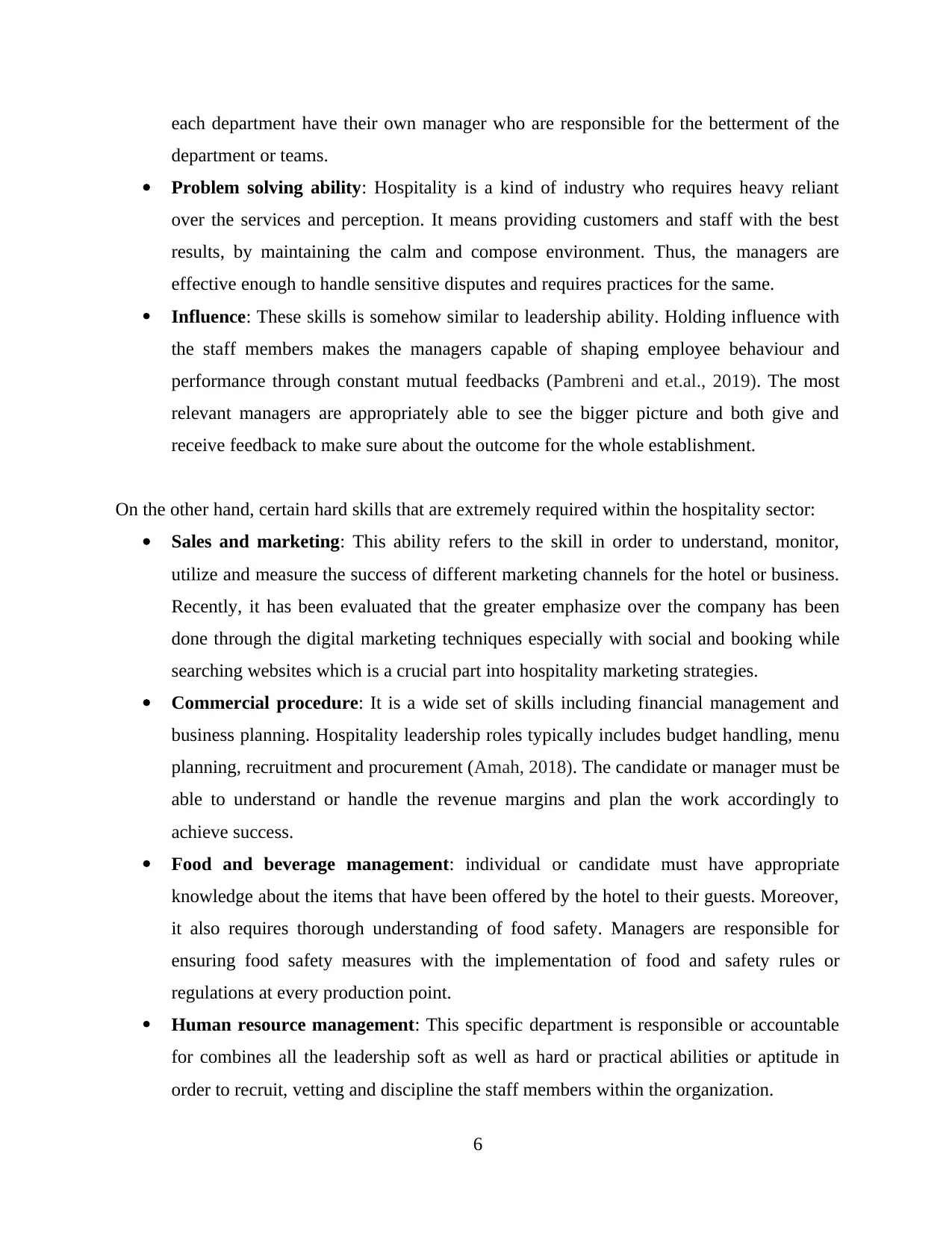
each department have their own manager who are responsible for the betterment of the
department or teams.
Problem solving ability: Hospitality is a kind of industry who requires heavy reliant
over the services and perception. It means providing customers and staff with the best
results, by maintaining the calm and compose environment. Thus, the managers are
effective enough to handle sensitive disputes and requires practices for the same.
Influence: These skills is somehow similar to leadership ability. Holding influence with
the staff members makes the managers capable of shaping employee behaviour and
performance through constant mutual feedbacks (Pambreni and et.al., 2019). The most
relevant managers are appropriately able to see the bigger picture and both give and
receive feedback to make sure about the outcome for the whole establishment.
On the other hand, certain hard skills that are extremely required within the hospitality sector:
Sales and marketing: This ability refers to the skill in order to understand, monitor,
utilize and measure the success of different marketing channels for the hotel or business.
Recently, it has been evaluated that the greater emphasize over the company has been
done through the digital marketing techniques especially with social and booking while
searching websites which is a crucial part into hospitality marketing strategies.
Commercial procedure: It is a wide set of skills including financial management and
business planning. Hospitality leadership roles typically includes budget handling, menu
planning, recruitment and procurement (Amah, 2018). The candidate or manager must be
able to understand or handle the revenue margins and plan the work accordingly to
achieve success.
Food and beverage management: individual or candidate must have appropriate
knowledge about the items that have been offered by the hotel to their guests. Moreover,
it also requires thorough understanding of food safety. Managers are responsible for
ensuring food safety measures with the implementation of food and safety rules or
regulations at every production point.
Human resource management: This specific department is responsible or accountable
for combines all the leadership soft as well as hard or practical abilities or aptitude in
order to recruit, vetting and discipline the staff members within the organization.
6
department or teams.
Problem solving ability: Hospitality is a kind of industry who requires heavy reliant
over the services and perception. It means providing customers and staff with the best
results, by maintaining the calm and compose environment. Thus, the managers are
effective enough to handle sensitive disputes and requires practices for the same.
Influence: These skills is somehow similar to leadership ability. Holding influence with
the staff members makes the managers capable of shaping employee behaviour and
performance through constant mutual feedbacks (Pambreni and et.al., 2019). The most
relevant managers are appropriately able to see the bigger picture and both give and
receive feedback to make sure about the outcome for the whole establishment.
On the other hand, certain hard skills that are extremely required within the hospitality sector:
Sales and marketing: This ability refers to the skill in order to understand, monitor,
utilize and measure the success of different marketing channels for the hotel or business.
Recently, it has been evaluated that the greater emphasize over the company has been
done through the digital marketing techniques especially with social and booking while
searching websites which is a crucial part into hospitality marketing strategies.
Commercial procedure: It is a wide set of skills including financial management and
business planning. Hospitality leadership roles typically includes budget handling, menu
planning, recruitment and procurement (Amah, 2018). The candidate or manager must be
able to understand or handle the revenue margins and plan the work accordingly to
achieve success.
Food and beverage management: individual or candidate must have appropriate
knowledge about the items that have been offered by the hotel to their guests. Moreover,
it also requires thorough understanding of food safety. Managers are responsible for
ensuring food safety measures with the implementation of food and safety rules or
regulations at every production point.
Human resource management: This specific department is responsible or accountable
for combines all the leadership soft as well as hard or practical abilities or aptitude in
order to recruit, vetting and discipline the staff members within the organization.
6
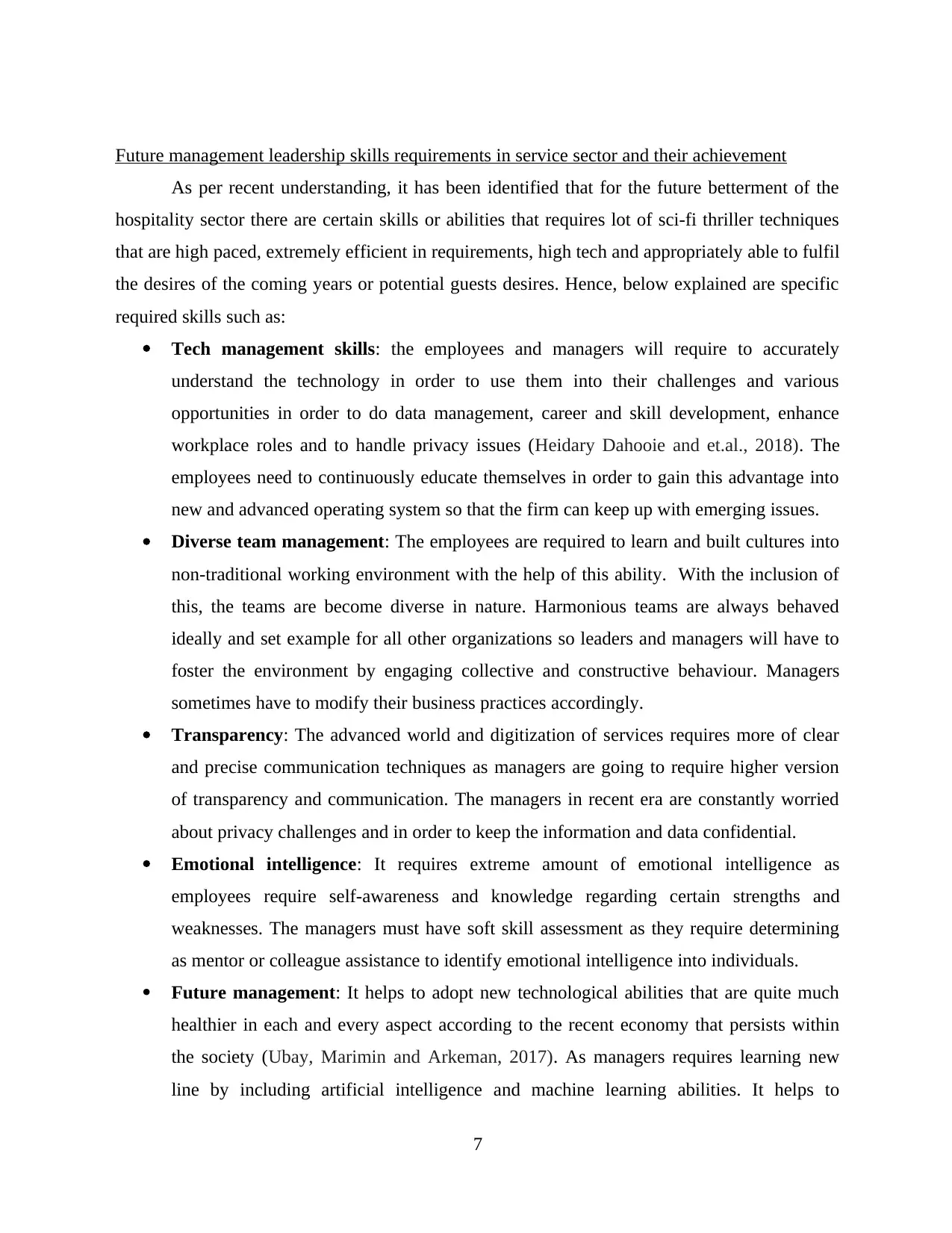
Future management leadership skills requirements in service sector and their achievement
As per recent understanding, it has been identified that for the future betterment of the
hospitality sector there are certain skills or abilities that requires lot of sci-fi thriller techniques
that are high paced, extremely efficient in requirements, high tech and appropriately able to fulfil
the desires of the coming years or potential guests desires. Hence, below explained are specific
required skills such as:
Tech management skills: the employees and managers will require to accurately
understand the technology in order to use them into their challenges and various
opportunities in order to do data management, career and skill development, enhance
workplace roles and to handle privacy issues (Heidary Dahooie and et.al., 2018). The
employees need to continuously educate themselves in order to gain this advantage into
new and advanced operating system so that the firm can keep up with emerging issues.
Diverse team management: The employees are required to learn and built cultures into
non-traditional working environment with the help of this ability. With the inclusion of
this, the teams are become diverse in nature. Harmonious teams are always behaved
ideally and set example for all other organizations so leaders and managers will have to
foster the environment by engaging collective and constructive behaviour. Managers
sometimes have to modify their business practices accordingly.
Transparency: The advanced world and digitization of services requires more of clear
and precise communication techniques as managers are going to require higher version
of transparency and communication. The managers in recent era are constantly worried
about privacy challenges and in order to keep the information and data confidential.
Emotional intelligence: It requires extreme amount of emotional intelligence as
employees require self-awareness and knowledge regarding certain strengths and
weaknesses. The managers must have soft skill assessment as they require determining
as mentor or colleague assistance to identify emotional intelligence into individuals.
Future management: It helps to adopt new technological abilities that are quite much
healthier in each and every aspect according to the recent economy that persists within
the society (Ubay, Marimin and Arkeman, 2017). As managers requires learning new
line by including artificial intelligence and machine learning abilities. It helps to
7
As per recent understanding, it has been identified that for the future betterment of the
hospitality sector there are certain skills or abilities that requires lot of sci-fi thriller techniques
that are high paced, extremely efficient in requirements, high tech and appropriately able to fulfil
the desires of the coming years or potential guests desires. Hence, below explained are specific
required skills such as:
Tech management skills: the employees and managers will require to accurately
understand the technology in order to use them into their challenges and various
opportunities in order to do data management, career and skill development, enhance
workplace roles and to handle privacy issues (Heidary Dahooie and et.al., 2018). The
employees need to continuously educate themselves in order to gain this advantage into
new and advanced operating system so that the firm can keep up with emerging issues.
Diverse team management: The employees are required to learn and built cultures into
non-traditional working environment with the help of this ability. With the inclusion of
this, the teams are become diverse in nature. Harmonious teams are always behaved
ideally and set example for all other organizations so leaders and managers will have to
foster the environment by engaging collective and constructive behaviour. Managers
sometimes have to modify their business practices accordingly.
Transparency: The advanced world and digitization of services requires more of clear
and precise communication techniques as managers are going to require higher version
of transparency and communication. The managers in recent era are constantly worried
about privacy challenges and in order to keep the information and data confidential.
Emotional intelligence: It requires extreme amount of emotional intelligence as
employees require self-awareness and knowledge regarding certain strengths and
weaknesses. The managers must have soft skill assessment as they require determining
as mentor or colleague assistance to identify emotional intelligence into individuals.
Future management: It helps to adopt new technological abilities that are quite much
healthier in each and every aspect according to the recent economy that persists within
the society (Ubay, Marimin and Arkeman, 2017). As managers requires learning new
line by including artificial intelligence and machine learning abilities. It helps to
7
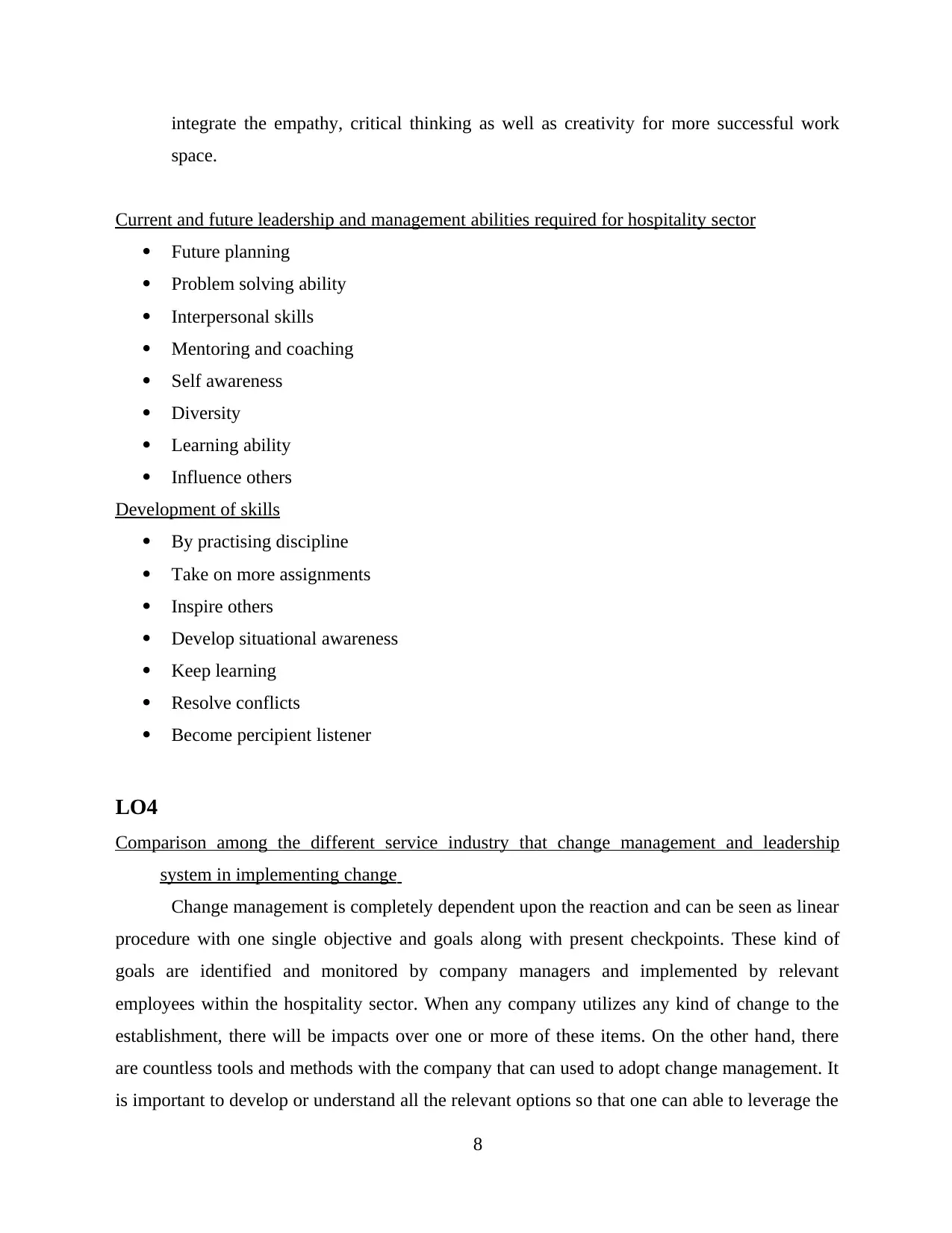
integrate the empathy, critical thinking as well as creativity for more successful work
space.
Current and future leadership and management abilities required for hospitality sector
Future planning
Problem solving ability
Interpersonal skills
Mentoring and coaching
Self awareness
Diversity
Learning ability
Influence others
Development of skills
By practising discipline
Take on more assignments
Inspire others
Develop situational awareness
Keep learning
Resolve conflicts
Become percipient listener
LO4
Comparison among the different service industry that change management and leadership
system in implementing change
Change management is completely dependent upon the reaction and can be seen as linear
procedure with one single objective and goals along with present checkpoints. These kind of
goals are identified and monitored by company managers and implemented by relevant
employees within the hospitality sector. When any company utilizes any kind of change to the
establishment, there will be impacts over one or more of these items. On the other hand, there
are countless tools and methods with the company that can used to adopt change management. It
is important to develop or understand all the relevant options so that one can able to leverage the
8
space.
Current and future leadership and management abilities required for hospitality sector
Future planning
Problem solving ability
Interpersonal skills
Mentoring and coaching
Self awareness
Diversity
Learning ability
Influence others
Development of skills
By practising discipline
Take on more assignments
Inspire others
Develop situational awareness
Keep learning
Resolve conflicts
Become percipient listener
LO4
Comparison among the different service industry that change management and leadership
system in implementing change
Change management is completely dependent upon the reaction and can be seen as linear
procedure with one single objective and goals along with present checkpoints. These kind of
goals are identified and monitored by company managers and implemented by relevant
employees within the hospitality sector. When any company utilizes any kind of change to the
establishment, there will be impacts over one or more of these items. On the other hand, there
are countless tools and methods with the company that can used to adopt change management. It
is important to develop or understand all the relevant options so that one can able to leverage the
8
Secure Best Marks with AI Grader
Need help grading? Try our AI Grader for instant feedback on your assignments.
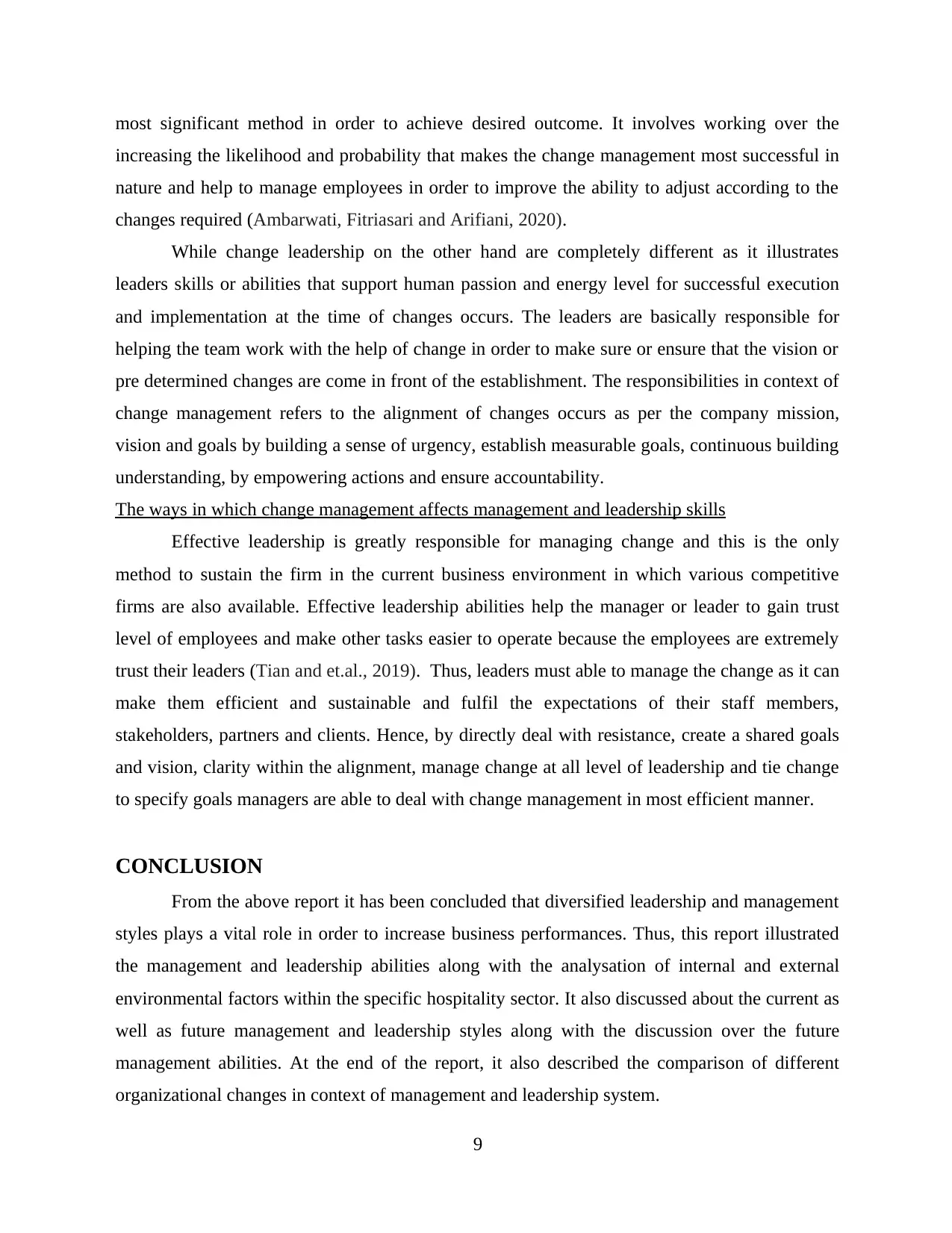
most significant method in order to achieve desired outcome. It involves working over the
increasing the likelihood and probability that makes the change management most successful in
nature and help to manage employees in order to improve the ability to adjust according to the
changes required (Ambarwati, Fitriasari and Arifiani, 2020).
While change leadership on the other hand are completely different as it illustrates
leaders skills or abilities that support human passion and energy level for successful execution
and implementation at the time of changes occurs. The leaders are basically responsible for
helping the team work with the help of change in order to make sure or ensure that the vision or
pre determined changes are come in front of the establishment. The responsibilities in context of
change management refers to the alignment of changes occurs as per the company mission,
vision and goals by building a sense of urgency, establish measurable goals, continuous building
understanding, by empowering actions and ensure accountability.
The ways in which change management affects management and leadership skills
Effective leadership is greatly responsible for managing change and this is the only
method to sustain the firm in the current business environment in which various competitive
firms are also available. Effective leadership abilities help the manager or leader to gain trust
level of employees and make other tasks easier to operate because the employees are extremely
trust their leaders (Tian and et.al., 2019). Thus, leaders must able to manage the change as it can
make them efficient and sustainable and fulfil the expectations of their staff members,
stakeholders, partners and clients. Hence, by directly deal with resistance, create a shared goals
and vision, clarity within the alignment, manage change at all level of leadership and tie change
to specify goals managers are able to deal with change management in most efficient manner.
CONCLUSION
From the above report it has been concluded that diversified leadership and management
styles plays a vital role in order to increase business performances. Thus, this report illustrated
the management and leadership abilities along with the analysation of internal and external
environmental factors within the specific hospitality sector. It also discussed about the current as
well as future management and leadership styles along with the discussion over the future
management abilities. At the end of the report, it also described the comparison of different
organizational changes in context of management and leadership system.
9
increasing the likelihood and probability that makes the change management most successful in
nature and help to manage employees in order to improve the ability to adjust according to the
changes required (Ambarwati, Fitriasari and Arifiani, 2020).
While change leadership on the other hand are completely different as it illustrates
leaders skills or abilities that support human passion and energy level for successful execution
and implementation at the time of changes occurs. The leaders are basically responsible for
helping the team work with the help of change in order to make sure or ensure that the vision or
pre determined changes are come in front of the establishment. The responsibilities in context of
change management refers to the alignment of changes occurs as per the company mission,
vision and goals by building a sense of urgency, establish measurable goals, continuous building
understanding, by empowering actions and ensure accountability.
The ways in which change management affects management and leadership skills
Effective leadership is greatly responsible for managing change and this is the only
method to sustain the firm in the current business environment in which various competitive
firms are also available. Effective leadership abilities help the manager or leader to gain trust
level of employees and make other tasks easier to operate because the employees are extremely
trust their leaders (Tian and et.al., 2019). Thus, leaders must able to manage the change as it can
make them efficient and sustainable and fulfil the expectations of their staff members,
stakeholders, partners and clients. Hence, by directly deal with resistance, create a shared goals
and vision, clarity within the alignment, manage change at all level of leadership and tie change
to specify goals managers are able to deal with change management in most efficient manner.
CONCLUSION
From the above report it has been concluded that diversified leadership and management
styles plays a vital role in order to increase business performances. Thus, this report illustrated
the management and leadership abilities along with the analysation of internal and external
environmental factors within the specific hospitality sector. It also discussed about the current as
well as future management and leadership styles along with the discussion over the future
management abilities. At the end of the report, it also described the comparison of different
organizational changes in context of management and leadership system.
9
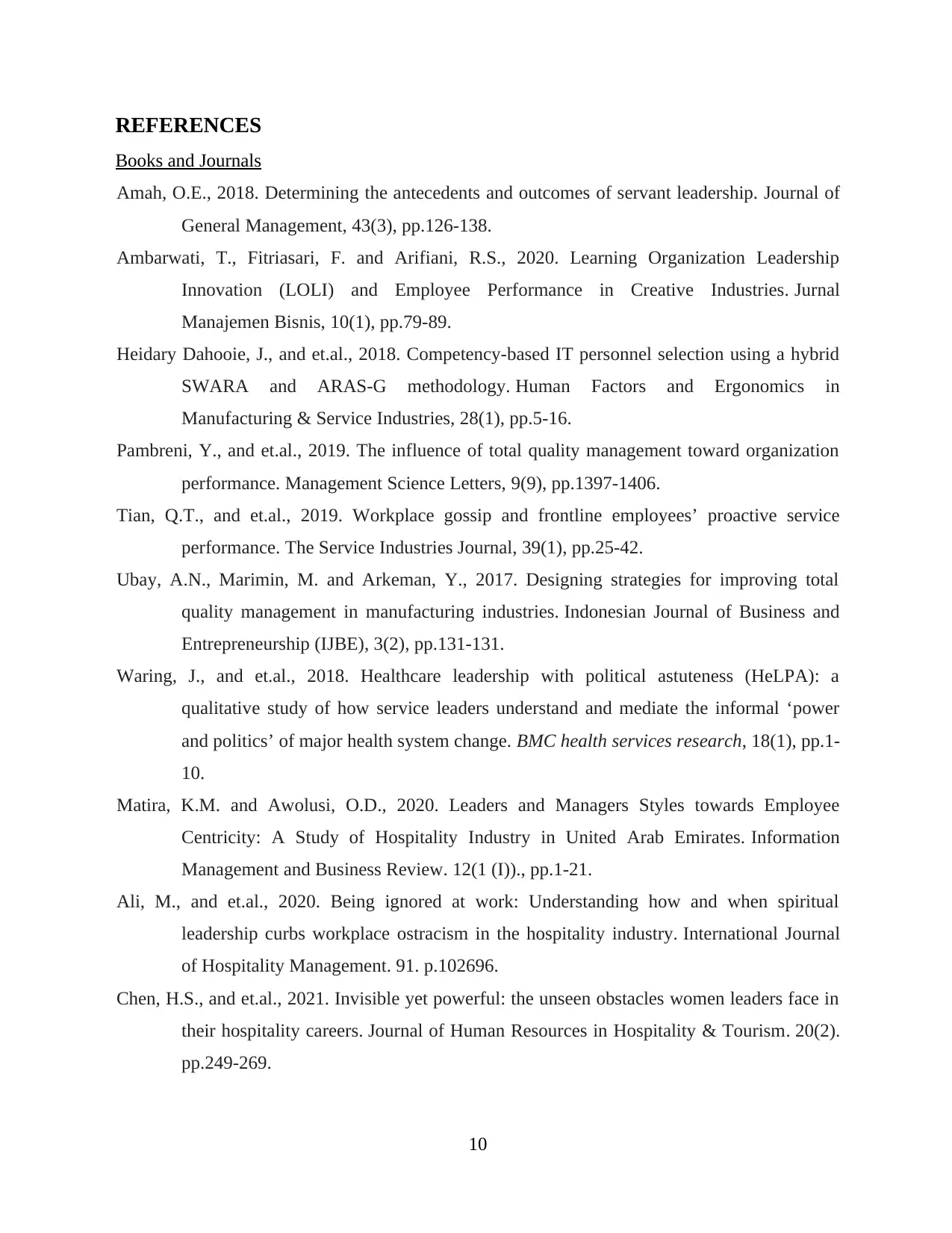
REFERENCES
Books and Journals
Amah, O.E., 2018. Determining the antecedents and outcomes of servant leadership. Journal of
General Management, 43(3), pp.126-138.
Ambarwati, T., Fitriasari, F. and Arifiani, R.S., 2020. Learning Organization Leadership
Innovation (LOLI) and Employee Performance in Creative Industries. Jurnal
Manajemen Bisnis, 10(1), pp.79-89.
Heidary Dahooie, J., and et.al., 2018. Competency‐based IT personnel selection using a hybrid
SWARA and ARAS‐G methodology. Human Factors and Ergonomics in
Manufacturing & Service Industries, 28(1), pp.5-16.
Pambreni, Y., and et.al., 2019. The influence of total quality management toward organization
performance. Management Science Letters, 9(9), pp.1397-1406.
Tian, Q.T., and et.al., 2019. Workplace gossip and frontline employees’ proactive service
performance. The Service Industries Journal, 39(1), pp.25-42.
Ubay, A.N., Marimin, M. and Arkeman, Y., 2017. Designing strategies for improving total
quality management in manufacturing industries. Indonesian Journal of Business and
Entrepreneurship (IJBE), 3(2), pp.131-131.
Waring, J., and et.al., 2018. Healthcare leadership with political astuteness (HeLPA): a
qualitative study of how service leaders understand and mediate the informal ‘power
and politics’ of major health system change. BMC health services research, 18(1), pp.1-
10.
Matira, K.M. and Awolusi, O.D., 2020. Leaders and Managers Styles towards Employee
Centricity: A Study of Hospitality Industry in United Arab Emirates. Information
Management and Business Review. 12(1 (I))., pp.1-21.
Ali, M., and et.al., 2020. Being ignored at work: Understanding how and when spiritual
leadership curbs workplace ostracism in the hospitality industry. International Journal
of Hospitality Management. 91. p.102696.
Chen, H.S., and et.al., 2021. Invisible yet powerful: the unseen obstacles women leaders face in
their hospitality careers. Journal of Human Resources in Hospitality & Tourism. 20(2).
pp.249-269.
10
Books and Journals
Amah, O.E., 2018. Determining the antecedents and outcomes of servant leadership. Journal of
General Management, 43(3), pp.126-138.
Ambarwati, T., Fitriasari, F. and Arifiani, R.S., 2020. Learning Organization Leadership
Innovation (LOLI) and Employee Performance in Creative Industries. Jurnal
Manajemen Bisnis, 10(1), pp.79-89.
Heidary Dahooie, J., and et.al., 2018. Competency‐based IT personnel selection using a hybrid
SWARA and ARAS‐G methodology. Human Factors and Ergonomics in
Manufacturing & Service Industries, 28(1), pp.5-16.
Pambreni, Y., and et.al., 2019. The influence of total quality management toward organization
performance. Management Science Letters, 9(9), pp.1397-1406.
Tian, Q.T., and et.al., 2019. Workplace gossip and frontline employees’ proactive service
performance. The Service Industries Journal, 39(1), pp.25-42.
Ubay, A.N., Marimin, M. and Arkeman, Y., 2017. Designing strategies for improving total
quality management in manufacturing industries. Indonesian Journal of Business and
Entrepreneurship (IJBE), 3(2), pp.131-131.
Waring, J., and et.al., 2018. Healthcare leadership with political astuteness (HeLPA): a
qualitative study of how service leaders understand and mediate the informal ‘power
and politics’ of major health system change. BMC health services research, 18(1), pp.1-
10.
Matira, K.M. and Awolusi, O.D., 2020. Leaders and Managers Styles towards Employee
Centricity: A Study of Hospitality Industry in United Arab Emirates. Information
Management and Business Review. 12(1 (I))., pp.1-21.
Ali, M., and et.al., 2020. Being ignored at work: Understanding how and when spiritual
leadership curbs workplace ostracism in the hospitality industry. International Journal
of Hospitality Management. 91. p.102696.
Chen, H.S., and et.al., 2021. Invisible yet powerful: the unseen obstacles women leaders face in
their hospitality careers. Journal of Human Resources in Hospitality & Tourism. 20(2).
pp.249-269.
10
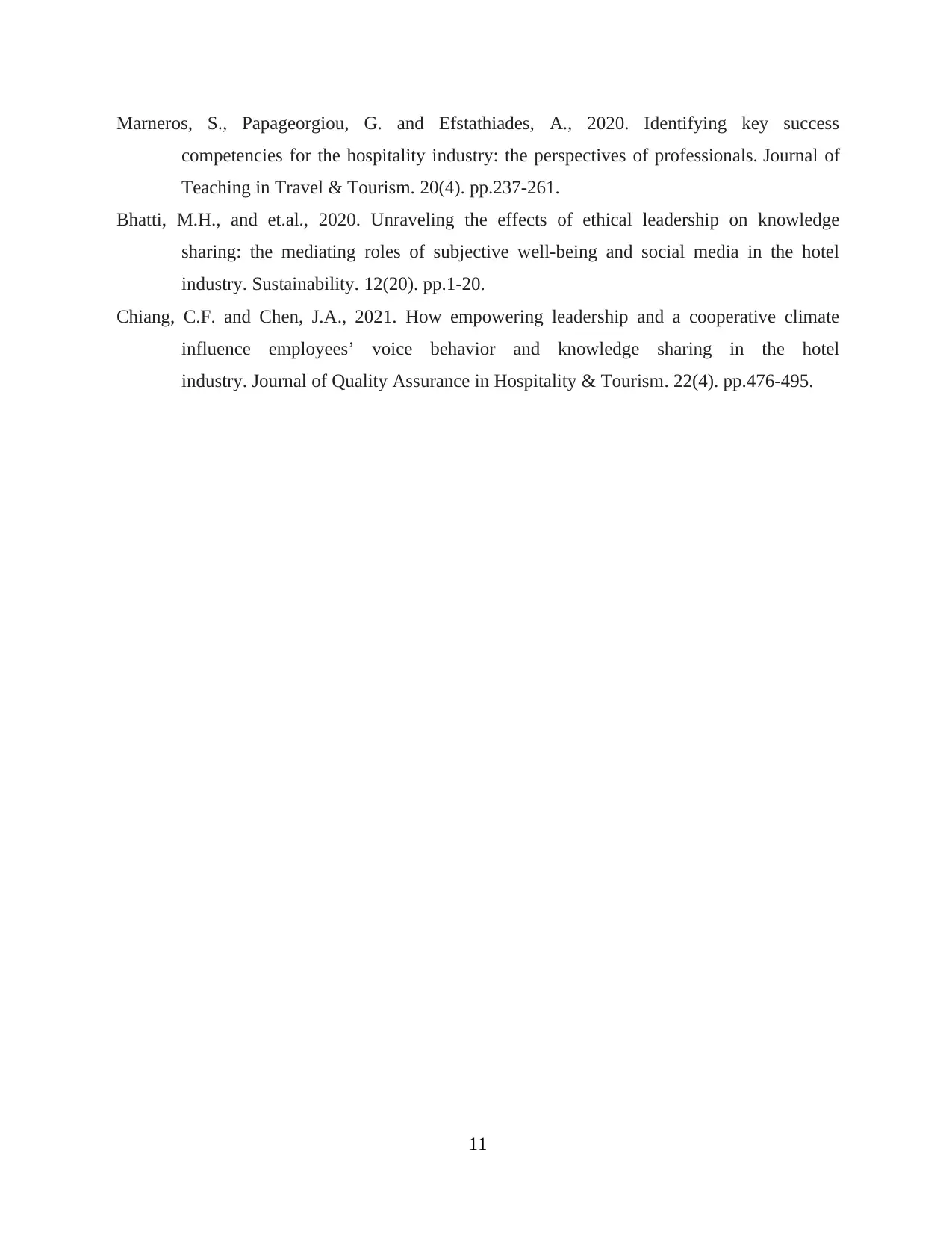
Marneros, S., Papageorgiou, G. and Efstathiades, A., 2020. Identifying key success
competencies for the hospitality industry: the perspectives of professionals. Journal of
Teaching in Travel & Tourism. 20(4). pp.237-261.
Bhatti, M.H., and et.al., 2020. Unraveling the effects of ethical leadership on knowledge
sharing: the mediating roles of subjective well-being and social media in the hotel
industry. Sustainability. 12(20). pp.1-20.
Chiang, C.F. and Chen, J.A., 2021. How empowering leadership and a cooperative climate
influence employees’ voice behavior and knowledge sharing in the hotel
industry. Journal of Quality Assurance in Hospitality & Tourism. 22(4). pp.476-495.
11
competencies for the hospitality industry: the perspectives of professionals. Journal of
Teaching in Travel & Tourism. 20(4). pp.237-261.
Bhatti, M.H., and et.al., 2020. Unraveling the effects of ethical leadership on knowledge
sharing: the mediating roles of subjective well-being and social media in the hotel
industry. Sustainability. 12(20). pp.1-20.
Chiang, C.F. and Chen, J.A., 2021. How empowering leadership and a cooperative climate
influence employees’ voice behavior and knowledge sharing in the hotel
industry. Journal of Quality Assurance in Hospitality & Tourism. 22(4). pp.476-495.
11
1 out of 13
Related Documents
Your All-in-One AI-Powered Toolkit for Academic Success.
+13062052269
info@desklib.com
Available 24*7 on WhatsApp / Email
![[object Object]](/_next/static/media/star-bottom.7253800d.svg)
Unlock your academic potential
© 2024 | Zucol Services PVT LTD | All rights reserved.





